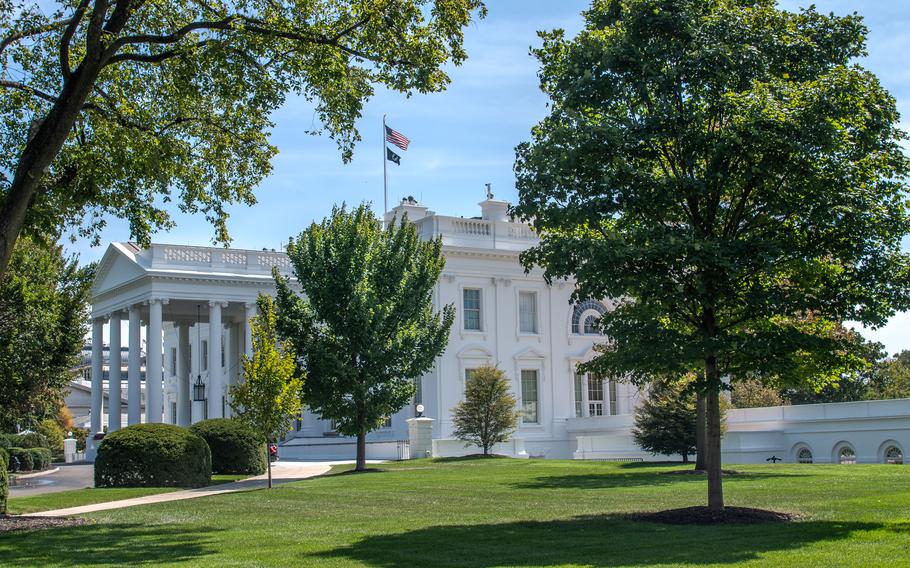
The House is set to vote this week on an annual defense spending bill that President Joe Biden said he would veto for harming service member access to reproductive health care, threatening the health of safety of LGBTQ+ troops and undermining readiness. Pictured is an undated photo of the White House. (Carlos Bongioanni/Stars and Stripes)
WASHINGTON — The House is set to vote this week on an annual defense spending bill that President Joe Biden said he would veto for harming service member access to reproductive health care, threatening the health of safety of LGBTQ+ troops and undermining readiness.
The legislation provides $833 billion to the Defense Department for a 4.5% pay raise for troops and investments in national security in fiscal 2025 but also contains conservative social policy riders that Democrats have revolted against.
The House is expected to hold a vote on the spending bill by Friday. The Senate has yet to release its version of the legislation.
“House Republicans are again wasting time with partisan bills,” the White House’s Office of Management and Budget wrote Monday in a statement criticizing the bill. The administration earlier this month also objected to parts of the House version of the National Defense Authorization Act, an annual defense policy bill that is funded by the spending bill.
The White House aimed it harshest criticism at provisions in the spending bill that would stop funding a travel reimbursement program for troops who need to cross state lines for abortion and other reproductive health care, strip funds from the Defense Department’s diversity and inclusion initiatives and prohibit funding of gender-affirming care for transgender service members.
More divisive amendments could be added to the legislation as the House Rules Committee meets Tuesday to decide which proposals will get a vote on the House floor. One amendment, which successfully passed the House last year but was removed during negotiations with the Senate, would reduce Defense Secretary Lloyd Austin’s salary to $1.
House Republicans have stressed their efforts to slash spending on social programs are geared toward refocusing the Pentagon on its war-fighting mission and preparing the military for long-term competition with China and other adversaries.
The White House argued the cuts, including $621 million from climate change initiatives and $53 billion from diversity programs, would have devastating consequences for military readiness and prevent the Defense Department from recruiting “a total force representative of America’s diversity.”
The administration also said it disagreed with a proposal to give junior enlisted service members an extra 15% pay raise ahead of a Pentagon review of the military basic pay table. The total 19.5% pay raise for junior troops would cost more than $3.3 billion in fiscal 2025 and is not fully funded by the House’s draft spending bill, according to the White House.
Funding cuts to parts of the White House’s budget request for defense also rankled the administration. The bill eliminates two planned ship procurements and provides $761 million less for shipbuilding than requested. It also fails to include money for a longstanding weapons acquisition and training program for Ukraine.
“Eliminating all Ukraine Security Assistance Initiative funding would undermine U.S. national security, undercut Ukraine’s ability to fight Russian aggression, and could cause Russia and other would-be aggressors around the world to question America’s commitment to a critical partner on the frontline of aggression,” the White House stated.
Administration officials said they also strongly opposed a provision that prohibited funds for any pier or structure built off the coast of Gaza. A $230 million temporary pier the U.S. military installed in May to rush food and aid to the embattled enclave has been plagued with operational issues but the White House said it was a “vital link in the humanitarian assistance chain.”
There is also White House resistance to a proposal that would transfer Mexico from Northern Command, which oversees military activity in the U.S., Puerto Rico, Canada, Mexico and the Bahamas, to Southern Command, which is responsible for security cooperation and operations in Central America, South America and the Caribbean.
The White House said the transfer would “unduly impinge” on the president’s authority to organize military command and control as well as “disrupt North America’s unified defense approach and create a seam between two combatant commands on the U.S. border.”